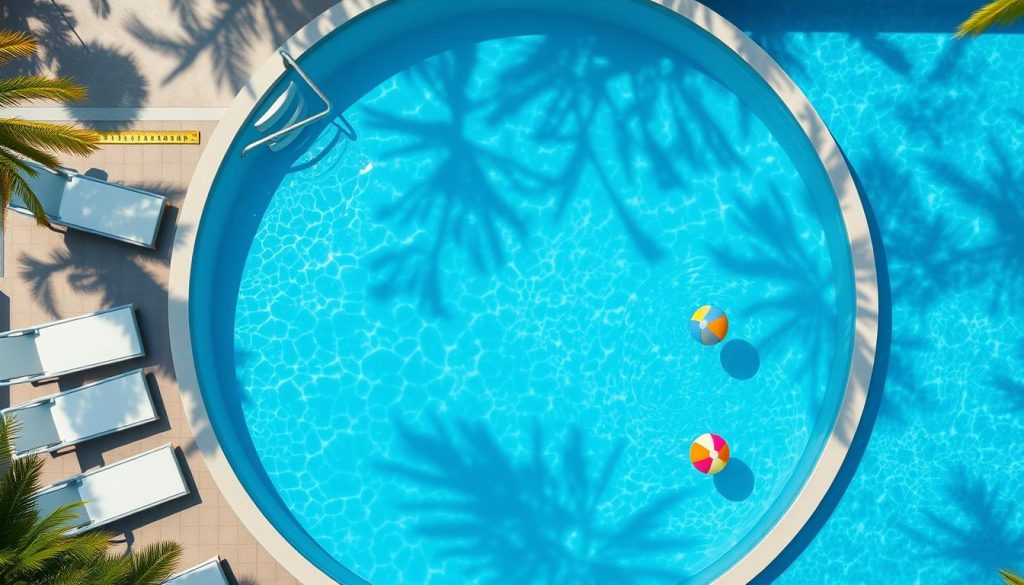
Ever wondered how much water your 27 ft round pool holds? Knowing your backyard pool’s volume is crucial for proper maintenance. It affects chemical treatments, energy costs, and your overall pool care routine.
Understanding pool capacity is vital for above-ground and inground pool owners alike. It’s key to keeping your pool in top shape. Let’s explore how to determine the gallons in a round pool.
We’ll explore pool dimensions and why knowing your pool’s gallon capacity matters. You’ll learn to use a pool size calculator step-by-step. We’ll also walk through calculating gallons in a 27 ft round pool.
Get ready to uncover the secrets of pool maintenance. You’ll soon master swimming pool capacity calculations. This knowledge will help you tackle any pool-related challenge.
Key Takeaways
- Knowing the gallons in your 27 ft round pool is crucial for proper maintenance and care.
- Pool volume affects chemical treatment, filtration efficiency, heating costs, and more.
- Understanding pool dimensions is key to calculating pool capacity.
- A pool size calculator simplifies the process of determining gallons in a round pool.
- Real-world examples help illustrate the importance of accurate pool volume calculations.
Understanding Pool Volume
Knowing your pool’s volume is vital for proper maintenance. It helps you keep a clean, safe swimming environment. Let’s explore why pool volume matters and what affects it.

Importance of Knowing Your Pool’s Gallon Capacity
Your pool’s gallon capacity guides chemical use. Adding the right amount keeps water safe and clean. It prevents skin irritation and equipment damage.
Pool volume also helps with filtration and circulation. It lets you choose the right equipment. You’ll know how long to run it for best results.
Factors Affecting Pool Volume
Several things influence your pool’s volume:
- Pool size: Length, width, and depth affect gallon capacity. Larger pools hold more water than smaller ones.
- Water depth: Average depth impacts volume. Deeper pools need more water to fill.
- Pool shape: Common shapes include rectangular, circular, oval, and freeform. Each has a unique volume calculation.
- Above-ground vs. inground pools: These have different volume calculations due to their distinct designs.
Here are examples of how these factors affect pool volume:
| Pool Size | Wall Height | Gallon Capacity (approx.) |
|---|---|---|
| 30 ft round | 54″ | 23,793 gallons |
| 18 ft round | 54″ | 8,565 gallons |
| 27 ft round | 52″ | 19,272 gallons |
| 24 ft round | 52″ | 15,227 gallons |
| 15′ x 30′ oval | 54″ | 15,147 gallons |
Small changes in size, shape, and depth can greatly affect gallon capacity. Knowing your pool’s volume helps with maintenance and chemical treatment. It also aids in equipment selection for a better swimming experience.
Calculating Gallons in a 27 ft Round Pool
Knowing your 27 ft round pool’s volume is key for proper care. It helps with water chemistry, filtration, and efficiency. Accurate gallon count guides chemical use and water management.
Formula for Determining Pool Volume
Use this formula to find your round pool’s volume:
Volume (in gallons) = π × radius^2 × depth × 7.5
Here, π is 3.14, radius is half the pool diameter. Depth is the pool’s average depth. The 7.5 factor converts cubic feet to gallons.
Step-by-Step Guide to Calculating how many gallons in a 27 ft round pool
- Measure the diameter of your pool and divide it by 2 to find the radius. For a 27 ft round pool, the radius would be 13.5 ft.
- Measure the average depth of your pool from the water surface to the bottom. This is typically the depth at the shallowest and deepest points, added together and divided by 2.
- Square the radius (multiply it by itself).
- Multiply the squared radius by π (3.14).
- Multiply the result by the average depth.
- Multiply the final result by 7.5 to convert cubic feet to gallons.
Real-World Example: 27 ft Round Pool with 54″ Wall Height
Let’s calculate a 27 ft round pool with a 54″ (4.5 ft) wall height:
- Radius = 27 ft ÷ 2 = 13.5 ft
- Average Depth = 4.5 ft
- Radius^2 = 13.5 × 13.5 = 182.25 sq ft
- 182.25 sq ft × 3.14 = 572.265 cu ft
- 572.265 cu ft × 4.5 ft = 2,575.1925 cu ft
- 2,575.1925 cu ft × 7.5 = 19,313.94 gallons
A 27 ft round pool with a 54″ wall height holds about 19,314 gallons.
| Pool Diameter | Wall Height | Average Depth | Pool Volume |
|---|---|---|---|
| 27 ft | 48″ | 4 ft | 17,167 gallons |
| 27 ft | 52″ | 4.33 ft | 18,597 gallons |
| 27 ft | 54″ | 4.5 ft | 19,314 gallons |
This formula helps you find your 27 ft round pool’s gallon count. Knowing this helps balance water, improve filtration, and manage energy use.
Implications of Pool Volume
Your pool’s volume affects maintenance and environmental responsibility. Calculating gallons in a 27 ft round pool helps determine proper chemical amounts. This ensures a safe and healthy swimming environment.
Chemical Treatment and Water Balance
Pool volume is vital for effective chemical treatment and water balance. Under-treating can cause unsanitary conditions. Over-treating may irritate skin and eyes or damage pool surfaces.
Accurate gallon calculations ensure precise chemical dosing. This leads to optimal pool maintenance for your 27 ft round pool.
Filtration and Circulation Efficiency
Pool volume impacts filtration and circulation systems’ efficiency. Larger pools need more powerful equipment for water clarity and hygiene. A 27 ft round pool typically holds 17,200 to 18,600 gallons.
Choose a pump and filter system that handles this water volume. This keeps your pool clean and inviting.
Heating Costs and Energy Consumption
Pool volume directly affects heating costs and energy use. Larger pools require more energy to maintain comfortable water temperatures. For a 27 ft round pool, energy consumption can be significant.
Understanding your pool’s volume helps make informed heating decisions. Consider options like solar covers, heat pumps, or gas heaters for energy efficiency.
Environmental Impact and Water Conservation
Large pools, like 27 ft round ones, need substantial water to fill and maintain. Understanding pool volume helps make eco-conscious decisions about water conservation.
Use pool covers to reduce evaporation and fix leaks promptly. Be mindful of water usage during maintenance tasks. Choose energy-efficient equipment and eco-friendly chemicals to reduce your pool’s ecological impact.
| Pool Size | Gallons | Cubic Feet | Water Cost (at $2.50 per 100 cubic feet) |
|---|---|---|---|
| 27′ Round Above Ground Pool | 17,200 – 18,600 | 230 – 248 | $575 – $620 |
| 18’x33′ Oval In-Ground Pool | 14,000 – 15,200 | 187 – 203 | $467.50 – $507.50 |
| 16’x32′ Rectangular In-Ground Pool | 19,200 | 256 | $640 |
Conclusion
Knowing your 27 ft round pool’s volume is crucial for proper maintenance. It helps determine the right amount of chemicals for water balance. This ensures a safe and enjoyable swimming experience for everyone.
Pool volume affects filtration, circulation, heating costs, and environmental impact. Our guide helps you calculate your pool’s gallons accurately. Consider factors like depth, shape, and additional features when estimating capacity.
Understanding pool volume is just the start of responsible ownership. Regular maintenance is key to a healthy swimming environment. This includes proper chemical treatment, filtration, and circulation.
Staying informed about pool care helps minimize water waste. It also reduces energy consumption and supports conservation efforts. At Pool Clinics, we provide knowledge for informed decisions about your 27 ft round pool.







